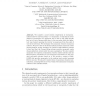Free Online Productivity Tools
i2Speak
i2Symbol
i2OCR
iTex2Img
iWeb2Print
iWeb2Shot
i2Type
iPdf2Split
iPdf2Merge
i2Bopomofo
i2Arabic
i2Style
i2Image
i2PDF
iLatex2Rtf
Sci2ools
ASIACRYPT
2001
Springer
2001
Springer
Key-Privacy in Public-Key Encryption
We consider a novel security requirement of encryption schemes that we call “key-privacy” or “anonymity”. It asks that an eavesdropper in possession of a ciphertext not be able to tell which specific key, out of a set of known public keys, is the one under which the ciphertext was created, meaning the receiver is anonymous from the point of view of the adversary. We investigate the anonymity of known encryption schemes. We prove that the El Gamal scheme provides anonymity under chosen-plaintext attack assuming the Decision Diffie-Hellman problem is hard and that the Cramer-Shoup scheme provides anonymity under chosen-ciphertext attack under the same assumption. We also consider anonymity for trapdoor permutations. Known attacks indicate that the RSA trapdoor permutation is not anonymous and neither are the standard encryption schemes based on it. We provide a variant of RSAOAEP that provides anonymity in the random oracle model assuming RSA is one-way. We also give constructio...
Related Content
| Added | 28 Jul 2010 |
| Updated | 28 Jul 2010 |
| Type | Conference |
| Year | 2001 |
| Where | ASIACRYPT |
| Authors | Mihir Bellare, Alexandra Boldyreva, Anand Desai, David Pointcheval |
Comments (0)

